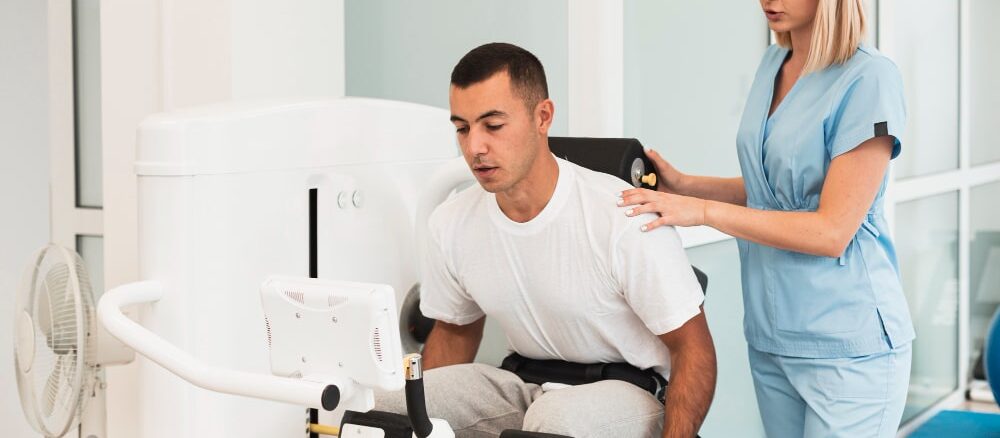Maintaining optimal health and preemptively identifying potential medical issues necessitate regular physical examinations. A comprehensive physical exam surpasses the customary check-up by offering a meticulous evaluation of one’s overall well-being. This article delves into the multiple facets of a comprehensive physical exam, encompassing its significance, components, typical screening tests, administration process, possible risks, and guidelines for preparation.
The Importance of a Comprehensive Physical Exam:
A comprehensive physical examination has several benefits. First of all, it enables your doctor to assess the health of your body and pinpoint any trouble spots. Second, it gives you a chance to talk about your health background, dietary habits, and probable risk factors for specific disorders. Finally, it enables your doctor to suggest screening exams and preventive steps based on your age, test outcomes, and medical background.
What Does a Comprehensive Physical Exam Address? The Components of a Comprehensive Physical Exam:
Updated Health History
Your physician will inquire about any recent alterations or additions to your medical history, including prescription drugs, allergies, surgeries, and lifestyle elements like your job and personal relationships.
Checking vital signs
To evaluate your general health and find any anomalies, vital indicators such as blood pressure, heart rate, and respiration rate are measured.
Visual Exam
To find potential indicators of underlying medical issues, numerous body components are visually examined. Your doctor will check the health of your nervous system, musculoskeletal system, chest, abdomen, and eyes.
Physical Exams
Your doctor will examine your eyes, ears, nose, and throat with a variety of equipment, as well as palpate (touch) various body regions to check for any anomalies.
Laboratory Tests
Blood samples may be collected to perform laboratory tests. These tests, including a complete blood count and a complete metabolic panel, help assess your kidney and liver function, blood chemistry, and immune system and detect any irregularities that may indicate underlying health issues. Depending on your risk factors, your doctor may request additional tests such as diabetes screening, thyroid screening, and lipid panel (cholesterol test).
Screening Tests during a Comprehensive Physical Exam
Screening tests are an essential part of a comprehensive physical exam. The specific tests recommended may differ based on biological sex.
Here are some common screening tests for both men and women:
Men
Cholesterol Test: Regular cholesterol checks are recommended from age 35 or earlier if at higher risk for heart disease or diabetes.
Prostate Cancer Screening: Recommended discussions with a doctor about screening starting at age 50 or earlier if at higher risk due to family history.
Testicular Exam: Doctor-conducted examination to check for abnormalities in the testicles.
Abdominal Aortic Aneurysm Screening: A one-time ultrasound test is recommended for men aged 65-75 who have a history of smoking.
Women
Mammogram: Recommended every two years for women aged 50-74, with earlier or more frequent testing based on personal and family history.
Breast Exam: Conducted to check for abnormal lumps or signs of breast cancer.
Pap Smear: A screening test for cervical cancer, starting at age 21 and repeated every three to five years based on age and risk factors.
Pelvic Exam: Performed to examine the vagina, cervix, and vulva for signs of infections or other conditions.
Cholesterol Test: Regular cholesterol checks are recommended from age 45 or earlier if at higher risk for heart disease or diabetes.
Osteoporosis Screening: Bone density scans starting around age 65 or earlier in certain medical conditions.
Both Men and Women
Colon (Colorectal) Cancer Test: Regular testing is recommended starting at age 50.
Lung Cancer Screening: Annual low-dose CT scan for individuals aged 55-80 with a significant history of smoking.
Depression Screening: Regular screening for symptoms of depression.
Diabetes Screening: Recommended for individuals with risk factors such as family history, high blood pressure, or high cholesterol.
Hepatitis C Screening: One-time blood test is recommended for individuals born between 1945 and 1965.
Vaccinations: Regular vaccinations are recommended based on age and specific health conditions.
STI Screening: Regular screenings for sexually transmitted infections, including HIV and syphilis.
HIV Test: Recommended as a one-time test or more frequently for individuals at risk.
Syphilis Test: Necessary for pregnant women and those at risk for syphilis.
Administration of the Exam: Most comprehensive physical exams are conducted in a doctor’s office or primary care clinic. For additional screenings or imaging tests, you may be referred to an imaging center or hospital. Blood samples are typically collected at the doctor’s office and sent to a lab for analysis.
Risks of the Test
The physical exam itself carries minimal risks. Some mild discomfort or pain may occur during a blood test when the needle is inserted, resulting in a small bruise. However, these side effects are temporary and generally resolve within a few days. It’s important to discuss any concerns or potential risks with your doctor before the examination.
Preparing for the Test
In most cases, there is no specific preparation required for a comprehensive physical exam. However, it is helpful to gather the necessary information before the visit. This includes details about allergies, current medications, recent lab test results, any medical devices you use (such as a pacemaker), and contact information for other doctors or specialists you are seeing. Prepare questions to ask your doctor about recommended screening tests, vaccines, family history, and lifestyle changes. Be ready to provide information about your exercise habits, smoking and alcohol consumption, diet, sleep patterns, and any unusual symptoms you may have experienced.
Counseling and Recommendations
A comprehensive physical exam often includes personalized counseling and recommendations based on your health assessment. Your healthcare provider may discuss lifestyle modifications, such as diet and exercise, smoking cessation, stress management techniques, or preventive measures, such as vaccinations.
Follow-up and Referrals
Your doctor may advise additional research or send you to specialists for specialized care or treatment if any anomalies or concerns are found during your comprehensive physical examination.
A comprehensive physical exam offers a comprehensive evaluation of your overall health, encompassing medical history review, vital signs assessment, general physical examination, laboratory tests, and additional diagnostic tests. By undergoing this thorough examination, you gain valuable insights into your health status, enabling early detection and intervention for potential health issues. Remember, regular check-ups and open communication with your healthcare provider are essential for maintaining optimal well-being and preventing future health complications.

